Organizational Effectiveness: Coaching Approaches and High Performance
VerifiedAdded on 2022/11/23
|19
|4897
|310
Report
AI Summary
This report delves into organizational effectiveness, emphasizing the crucial role of coaching in shaping organizational culture and driving high performance. It explores a systematic coaching approach, detailing the development of coaching individual frameworks, emotional expression capacity, and trust-building strategies. The report examines various coaching models (OSKAR, GROW, CLEAR) and theories (interpersonal trust), highlighting core coaching skills like listening, feedback, and courageous conversations. It also addresses peer review coaching, performance reviews, and the application of psychological and adult development theories to coaching. The study concludes that a strong link exists between organizational culture, learning, and effectiveness, which can be achieved through effective coaching processes. It recommends organizations build effective coaching processes to enhance performance.
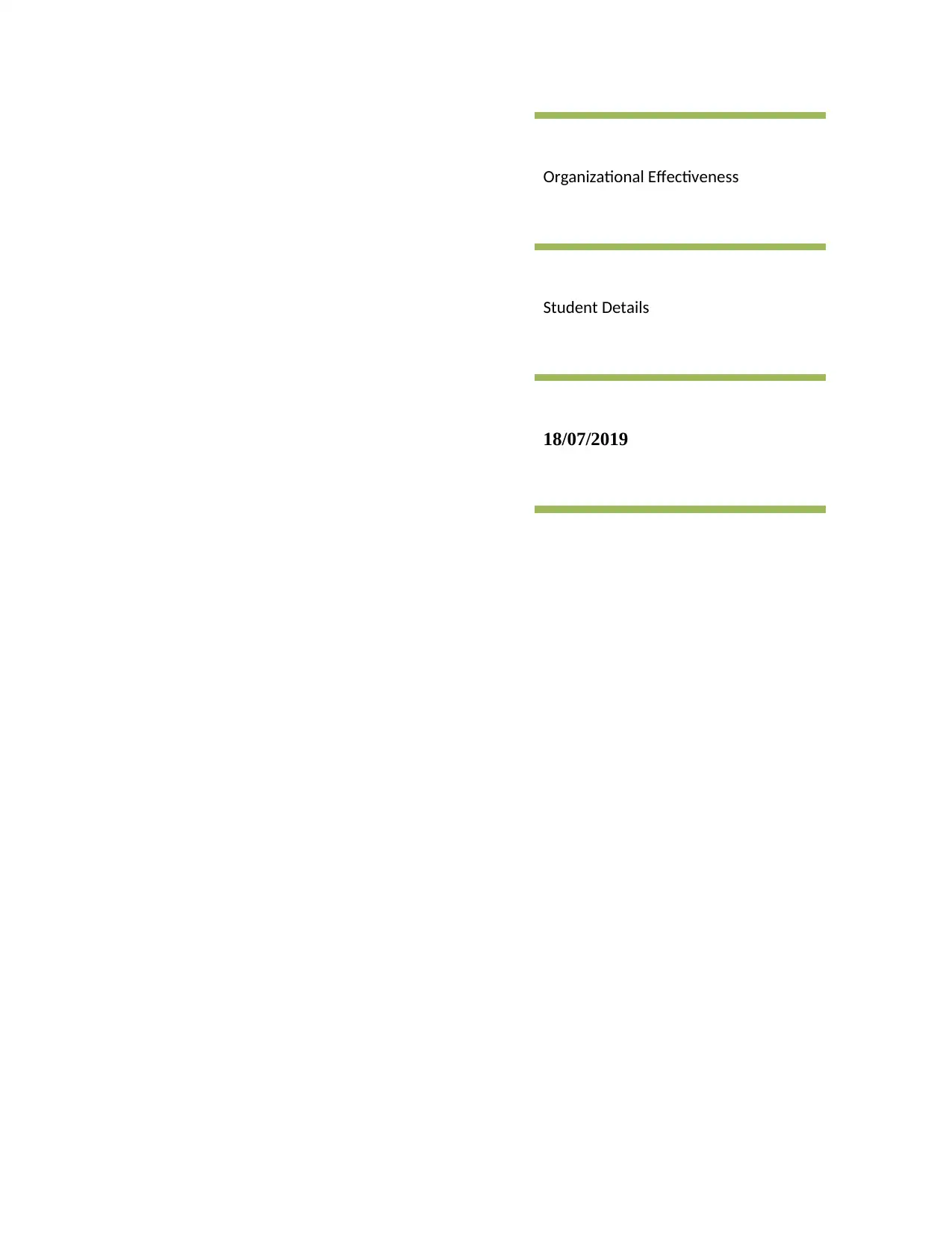
Organizational Effectiveness
Student Details
18/07/2019
Student Details
18/07/2019
Paraphrase This Document
Need a fresh take? Get an instant paraphrase of this document with our AI Paraphraser
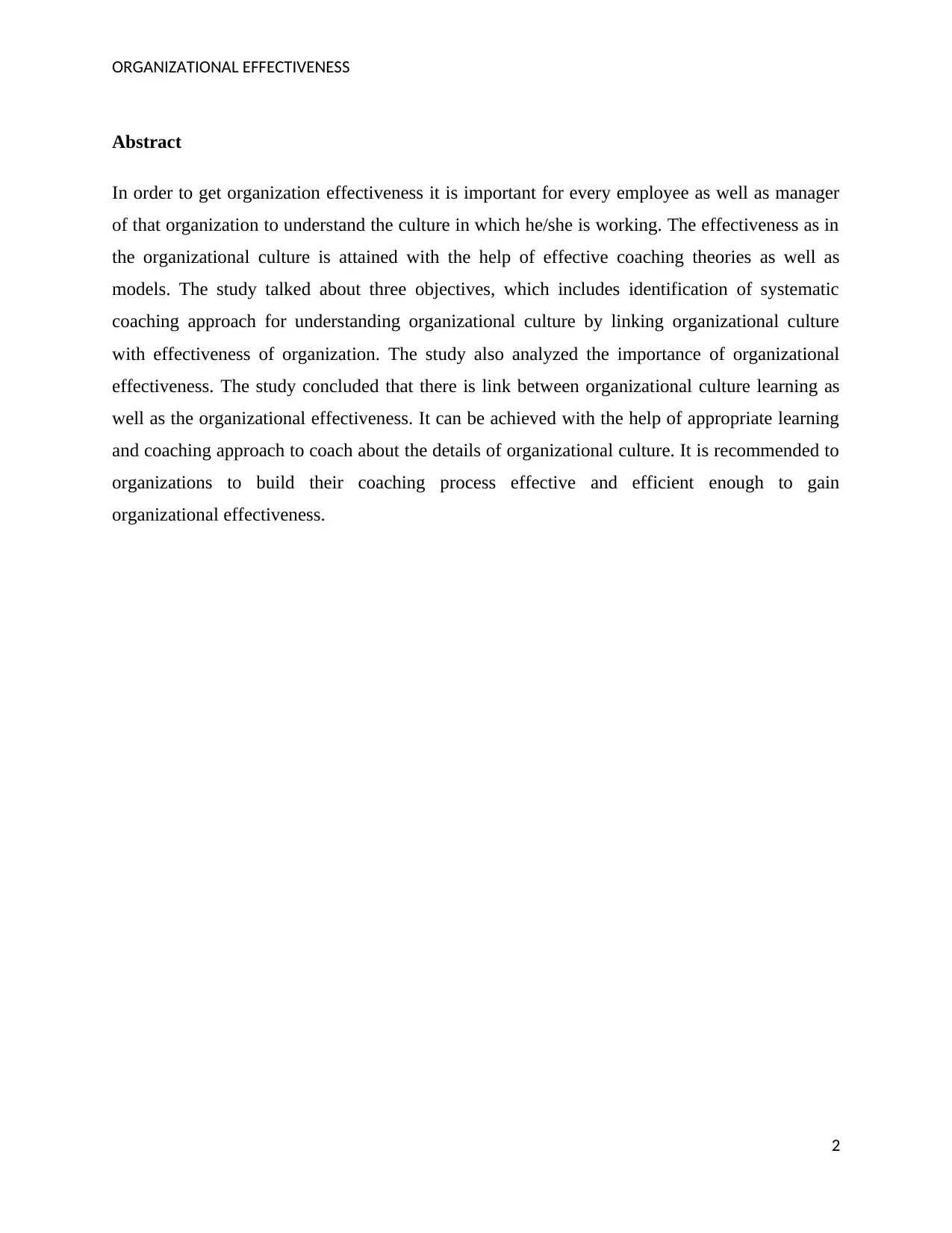
ORGANIZATIONAL EFFECTIVENESS
Abstract
In order to get organization effectiveness it is important for every employee as well as manager
of that organization to understand the culture in which he/she is working. The effectiveness as in
the organizational culture is attained with the help of effective coaching theories as well as
models. The study talked about three objectives, which includes identification of systematic
coaching approach for understanding organizational culture by linking organizational culture
with effectiveness of organization. The study also analyzed the importance of organizational
effectiveness. The study concluded that there is link between organizational culture learning as
well as the organizational effectiveness. It can be achieved with the help of appropriate learning
and coaching approach to coach about the details of organizational culture. It is recommended to
organizations to build their coaching process effective and efficient enough to gain
organizational effectiveness.
2
Abstract
In order to get organization effectiveness it is important for every employee as well as manager
of that organization to understand the culture in which he/she is working. The effectiveness as in
the organizational culture is attained with the help of effective coaching theories as well as
models. The study talked about three objectives, which includes identification of systematic
coaching approach for understanding organizational culture by linking organizational culture
with effectiveness of organization. The study also analyzed the importance of organizational
effectiveness. The study concluded that there is link between organizational culture learning as
well as the organizational effectiveness. It can be achieved with the help of appropriate learning
and coaching approach to coach about the details of organizational culture. It is recommended to
organizations to build their coaching process effective and efficient enough to gain
organizational effectiveness.
2
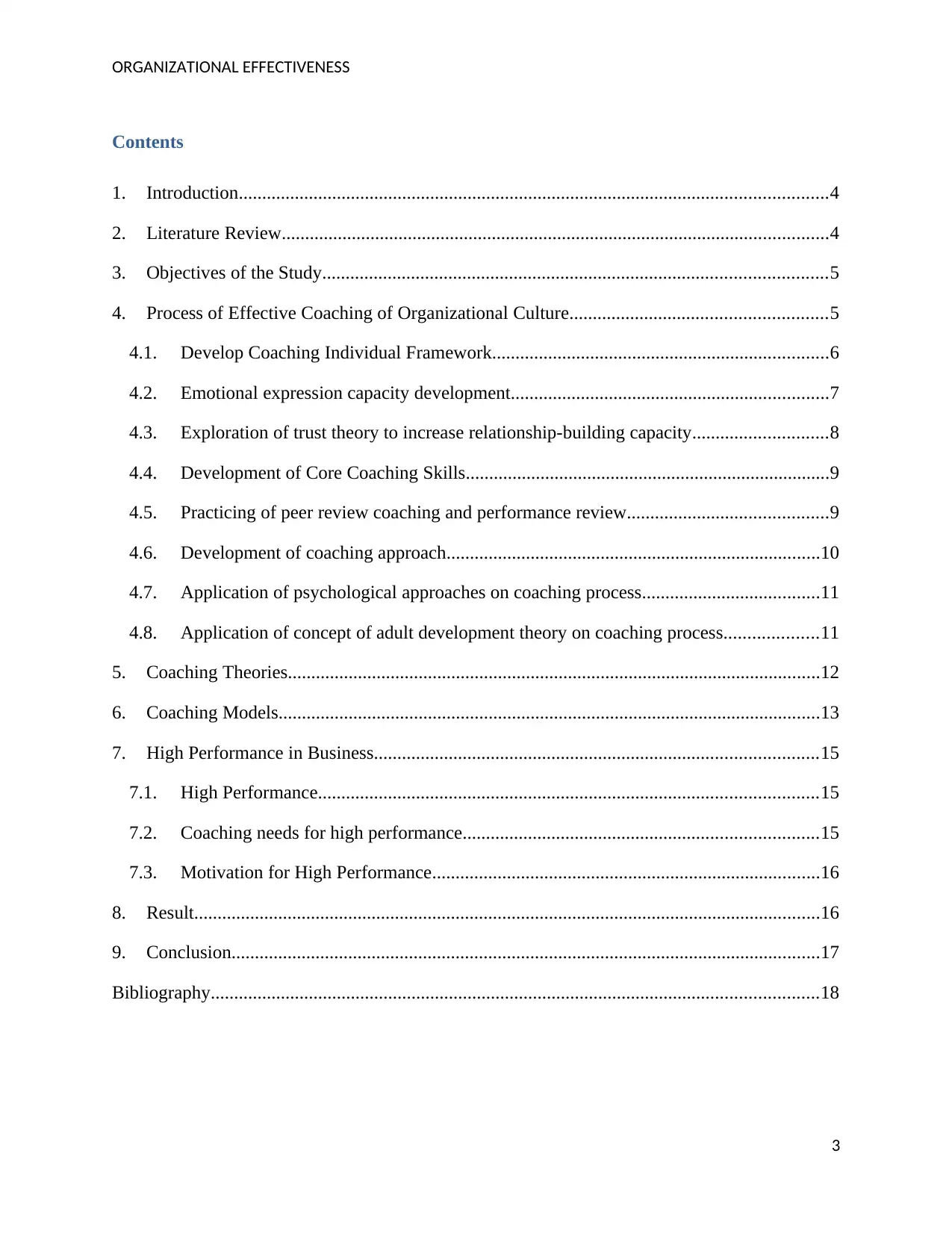
ORGANIZATIONAL EFFECTIVENESS
Contents
1. Introduction..............................................................................................................................4
2. Literature Review.....................................................................................................................4
3. Objectives of the Study............................................................................................................5
4. Process of Effective Coaching of Organizational Culture.......................................................5
4.1. Develop Coaching Individual Framework........................................................................6
4.2. Emotional expression capacity development....................................................................7
4.3. Exploration of trust theory to increase relationship-building capacity.............................8
4.4. Development of Core Coaching Skills..............................................................................9
4.5. Practicing of peer review coaching and performance review...........................................9
4.6. Development of coaching approach................................................................................10
4.7. Application of psychological approaches on coaching process......................................11
4.8. Application of concept of adult development theory on coaching process....................11
5. Coaching Theories..................................................................................................................12
6. Coaching Models....................................................................................................................13
7. High Performance in Business...............................................................................................15
7.1. High Performance...........................................................................................................15
7.2. Coaching needs for high performance............................................................................15
7.3. Motivation for High Performance...................................................................................16
8. Result......................................................................................................................................16
9. Conclusion..............................................................................................................................17
Bibliography..................................................................................................................................18
3
Contents
1. Introduction..............................................................................................................................4
2. Literature Review.....................................................................................................................4
3. Objectives of the Study............................................................................................................5
4. Process of Effective Coaching of Organizational Culture.......................................................5
4.1. Develop Coaching Individual Framework........................................................................6
4.2. Emotional expression capacity development....................................................................7
4.3. Exploration of trust theory to increase relationship-building capacity.............................8
4.4. Development of Core Coaching Skills..............................................................................9
4.5. Practicing of peer review coaching and performance review...........................................9
4.6. Development of coaching approach................................................................................10
4.7. Application of psychological approaches on coaching process......................................11
4.8. Application of concept of adult development theory on coaching process....................11
5. Coaching Theories..................................................................................................................12
6. Coaching Models....................................................................................................................13
7. High Performance in Business...............................................................................................15
7.1. High Performance...........................................................................................................15
7.2. Coaching needs for high performance............................................................................15
7.3. Motivation for High Performance...................................................................................16
8. Result......................................................................................................................................16
9. Conclusion..............................................................................................................................17
Bibliography..................................................................................................................................18
3
⊘ This is a preview!⊘
Do you want full access?
Subscribe today to unlock all pages.

Trusted by 1+ million students worldwide
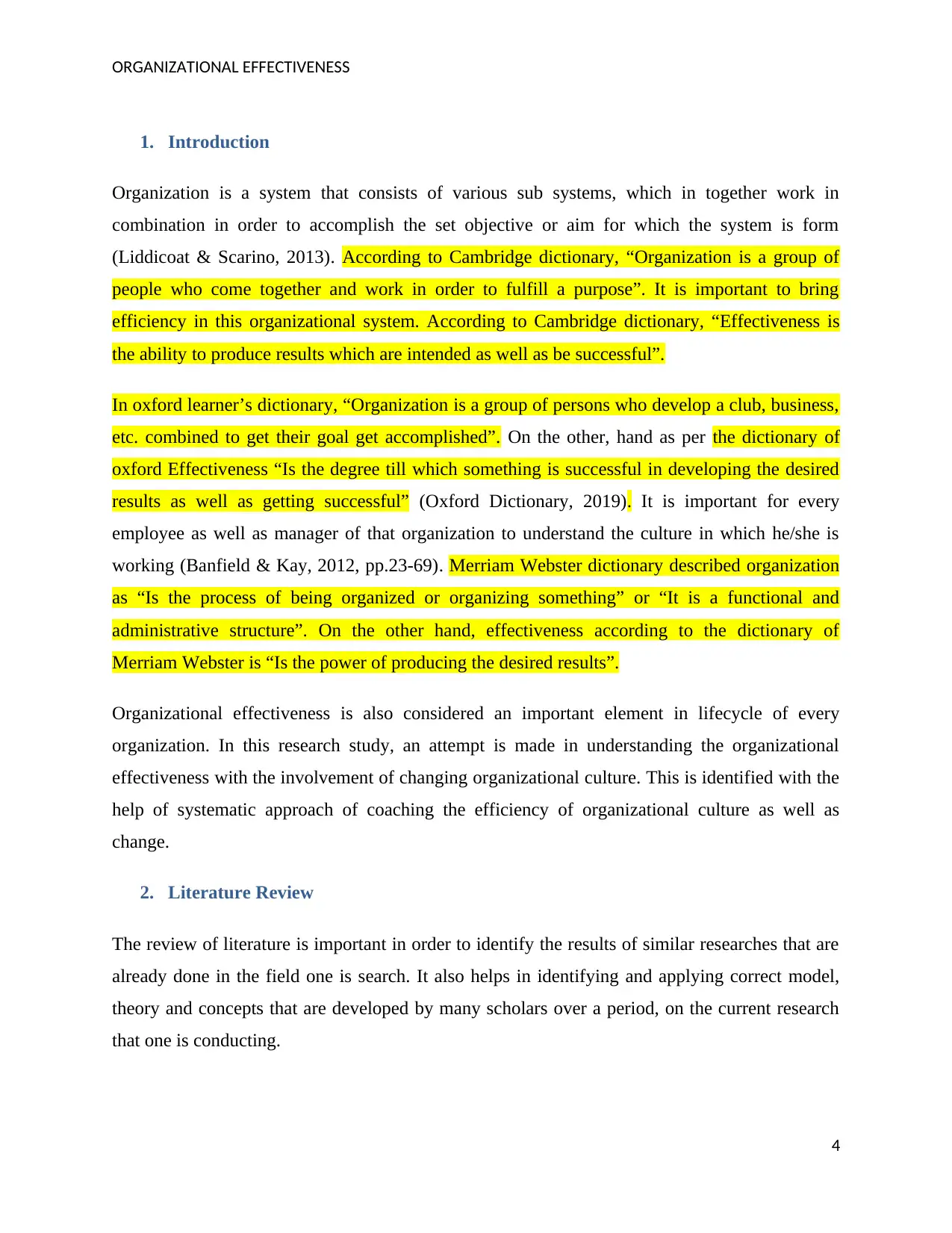
ORGANIZATIONAL EFFECTIVENESS
1. Introduction
Organization is a system that consists of various sub systems, which in together work in
combination in order to accomplish the set objective or aim for which the system is form
(Liddicoat & Scarino, 2013). According to Cambridge dictionary, “Organization is a group of
people who come together and work in order to fulfill a purpose”. It is important to bring
efficiency in this organizational system. According to Cambridge dictionary, “Effectiveness is
the ability to produce results which are intended as well as be successful”.
In oxford learner’s dictionary, “Organization is a group of persons who develop a club, business,
etc. combined to get their goal get accomplished”. On the other, hand as per the dictionary of
oxford Effectiveness “Is the degree till which something is successful in developing the desired
results as well as getting successful” (Oxford Dictionary, 2019). It is important for every
employee as well as manager of that organization to understand the culture in which he/she is
working (Banfield & Kay, 2012, pp.23-69). Merriam Webster dictionary described organization
as “Is the process of being organized or organizing something” or “It is a functional and
administrative structure”. On the other hand, effectiveness according to the dictionary of
Merriam Webster is “Is the power of producing the desired results”.
Organizational effectiveness is also considered an important element in lifecycle of every
organization. In this research study, an attempt is made in understanding the organizational
effectiveness with the involvement of changing organizational culture. This is identified with the
help of systematic approach of coaching the efficiency of organizational culture as well as
change.
2. Literature Review
The review of literature is important in order to identify the results of similar researches that are
already done in the field one is search. It also helps in identifying and applying correct model,
theory and concepts that are developed by many scholars over a period, on the current research
that one is conducting.
4
1. Introduction
Organization is a system that consists of various sub systems, which in together work in
combination in order to accomplish the set objective or aim for which the system is form
(Liddicoat & Scarino, 2013). According to Cambridge dictionary, “Organization is a group of
people who come together and work in order to fulfill a purpose”. It is important to bring
efficiency in this organizational system. According to Cambridge dictionary, “Effectiveness is
the ability to produce results which are intended as well as be successful”.
In oxford learner’s dictionary, “Organization is a group of persons who develop a club, business,
etc. combined to get their goal get accomplished”. On the other, hand as per the dictionary of
oxford Effectiveness “Is the degree till which something is successful in developing the desired
results as well as getting successful” (Oxford Dictionary, 2019). It is important for every
employee as well as manager of that organization to understand the culture in which he/she is
working (Banfield & Kay, 2012, pp.23-69). Merriam Webster dictionary described organization
as “Is the process of being organized or organizing something” or “It is a functional and
administrative structure”. On the other hand, effectiveness according to the dictionary of
Merriam Webster is “Is the power of producing the desired results”.
Organizational effectiveness is also considered an important element in lifecycle of every
organization. In this research study, an attempt is made in understanding the organizational
effectiveness with the involvement of changing organizational culture. This is identified with the
help of systematic approach of coaching the efficiency of organizational culture as well as
change.
2. Literature Review
The review of literature is important in order to identify the results of similar researches that are
already done in the field one is search. It also helps in identifying and applying correct model,
theory and concepts that are developed by many scholars over a period, on the current research
that one is conducting.
4
Paraphrase This Document
Need a fresh take? Get an instant paraphrase of this document with our AI Paraphraser
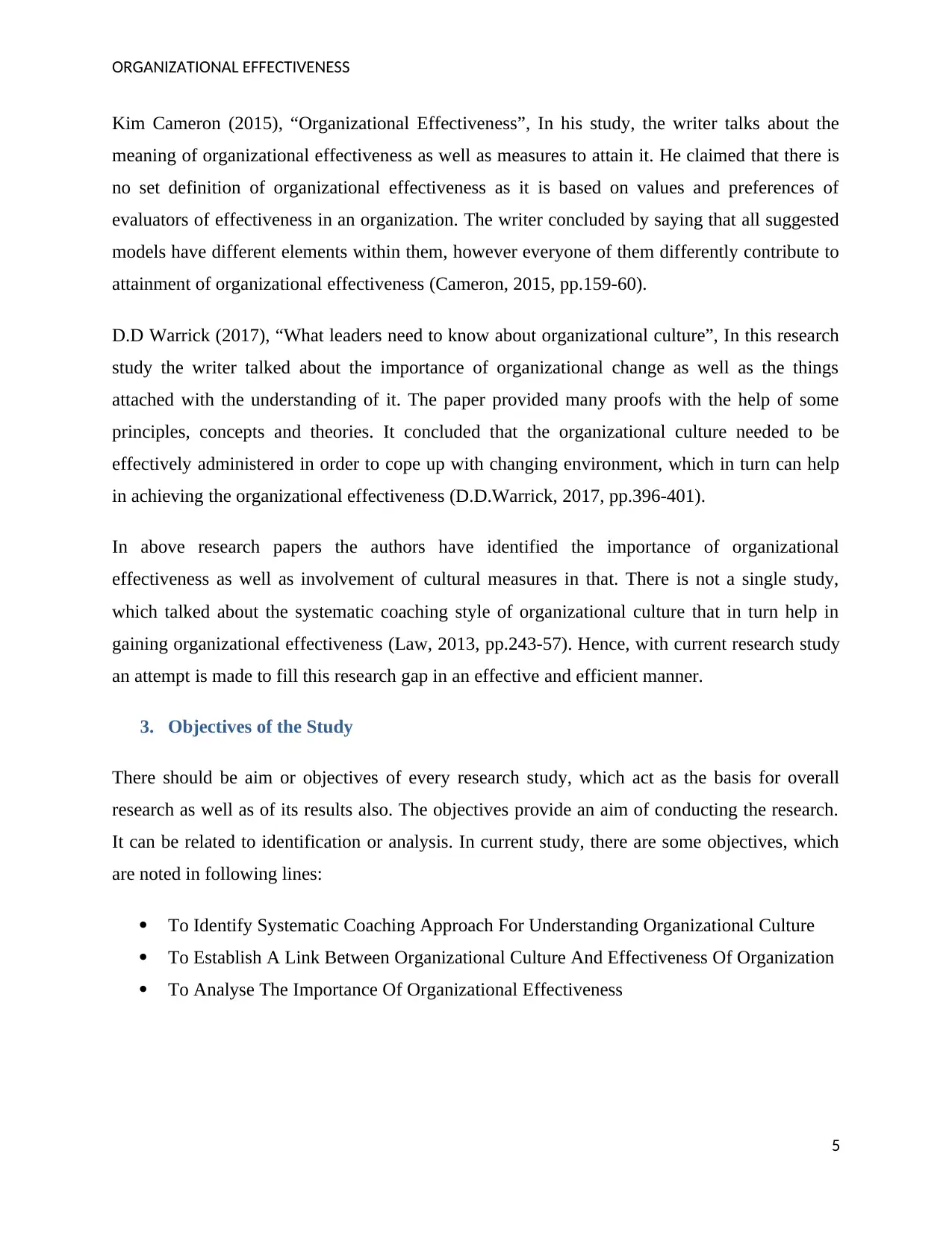
ORGANIZATIONAL EFFECTIVENESS
Kim Cameron (2015), “Organizational Effectiveness”, In his study, the writer talks about the
meaning of organizational effectiveness as well as measures to attain it. He claimed that there is
no set definition of organizational effectiveness as it is based on values and preferences of
evaluators of effectiveness in an organization. The writer concluded by saying that all suggested
models have different elements within them, however everyone of them differently contribute to
attainment of organizational effectiveness (Cameron, 2015, pp.159-60).
D.D Warrick (2017), “What leaders need to know about organizational culture”, In this research
study the writer talked about the importance of organizational change as well as the things
attached with the understanding of it. The paper provided many proofs with the help of some
principles, concepts and theories. It concluded that the organizational culture needed to be
effectively administered in order to cope up with changing environment, which in turn can help
in achieving the organizational effectiveness (D.D.Warrick, 2017, pp.396-401).
In above research papers the authors have identified the importance of organizational
effectiveness as well as involvement of cultural measures in that. There is not a single study,
which talked about the systematic coaching style of organizational culture that in turn help in
gaining organizational effectiveness (Law, 2013, pp.243-57). Hence, with current research study
an attempt is made to fill this research gap in an effective and efficient manner.
3. Objectives of the Study
There should be aim or objectives of every research study, which act as the basis for overall
research as well as of its results also. The objectives provide an aim of conducting the research.
It can be related to identification or analysis. In current study, there are some objectives, which
are noted in following lines:
To Identify Systematic Coaching Approach For Understanding Organizational Culture
To Establish A Link Between Organizational Culture And Effectiveness Of Organization
To Analyse The Importance Of Organizational Effectiveness
5
Kim Cameron (2015), “Organizational Effectiveness”, In his study, the writer talks about the
meaning of organizational effectiveness as well as measures to attain it. He claimed that there is
no set definition of organizational effectiveness as it is based on values and preferences of
evaluators of effectiveness in an organization. The writer concluded by saying that all suggested
models have different elements within them, however everyone of them differently contribute to
attainment of organizational effectiveness (Cameron, 2015, pp.159-60).
D.D Warrick (2017), “What leaders need to know about organizational culture”, In this research
study the writer talked about the importance of organizational change as well as the things
attached with the understanding of it. The paper provided many proofs with the help of some
principles, concepts and theories. It concluded that the organizational culture needed to be
effectively administered in order to cope up with changing environment, which in turn can help
in achieving the organizational effectiveness (D.D.Warrick, 2017, pp.396-401).
In above research papers the authors have identified the importance of organizational
effectiveness as well as involvement of cultural measures in that. There is not a single study,
which talked about the systematic coaching style of organizational culture that in turn help in
gaining organizational effectiveness (Law, 2013, pp.243-57). Hence, with current research study
an attempt is made to fill this research gap in an effective and efficient manner.
3. Objectives of the Study
There should be aim or objectives of every research study, which act as the basis for overall
research as well as of its results also. The objectives provide an aim of conducting the research.
It can be related to identification or analysis. In current study, there are some objectives, which
are noted in following lines:
To Identify Systematic Coaching Approach For Understanding Organizational Culture
To Establish A Link Between Organizational Culture And Effectiveness Of Organization
To Analyse The Importance Of Organizational Effectiveness
5
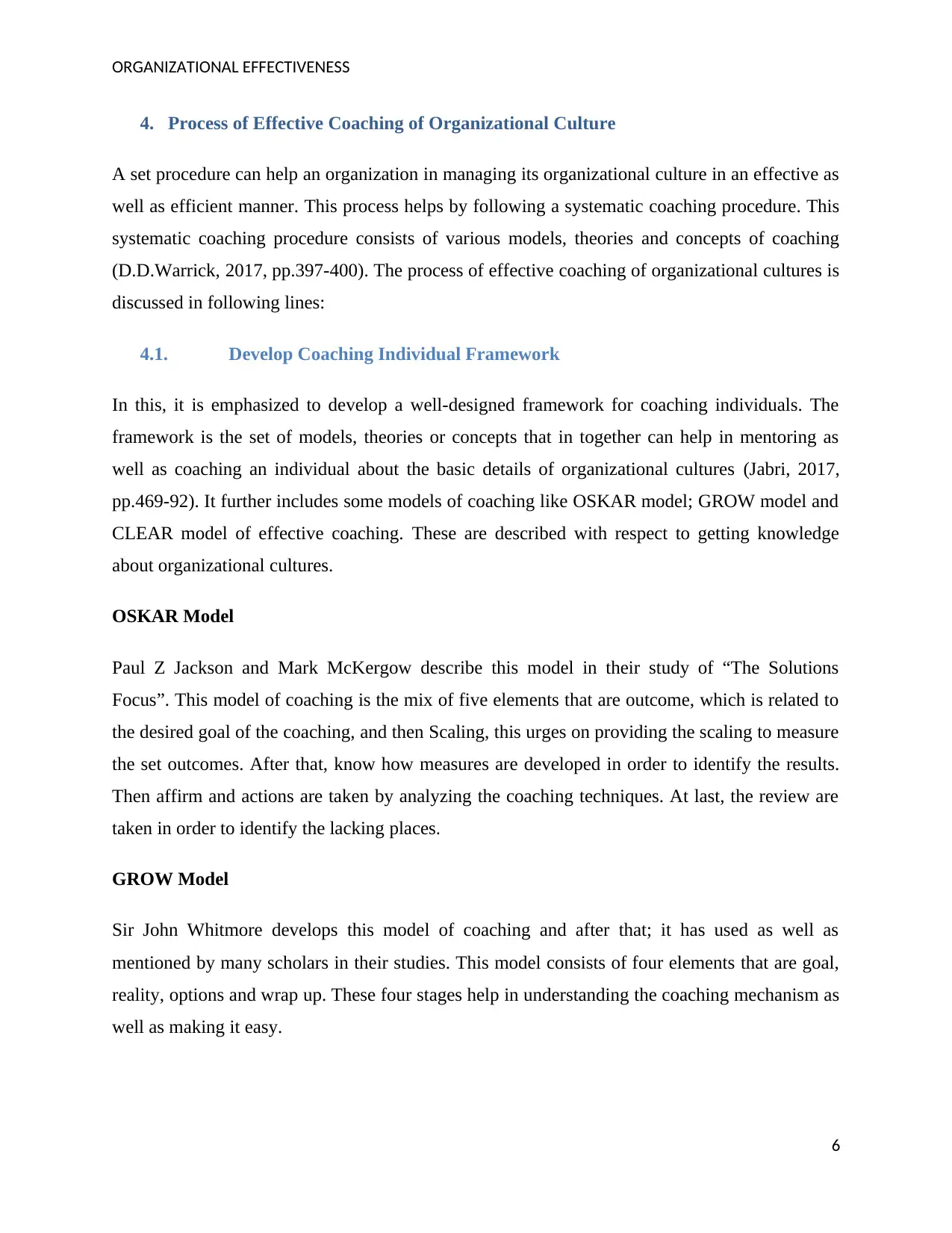
ORGANIZATIONAL EFFECTIVENESS
4. Process of Effective Coaching of Organizational Culture
A set procedure can help an organization in managing its organizational culture in an effective as
well as efficient manner. This process helps by following a systematic coaching procedure. This
systematic coaching procedure consists of various models, theories and concepts of coaching
(D.D.Warrick, 2017, pp.397-400). The process of effective coaching of organizational cultures is
discussed in following lines:
4.1. Develop Coaching Individual Framework
In this, it is emphasized to develop a well-designed framework for coaching individuals. The
framework is the set of models, theories or concepts that in together can help in mentoring as
well as coaching an individual about the basic details of organizational cultures (Jabri, 2017,
pp.469-92). It further includes some models of coaching like OSKAR model; GROW model and
CLEAR model of effective coaching. These are described with respect to getting knowledge
about organizational cultures.
OSKAR Model
Paul Z Jackson and Mark McKergow describe this model in their study of “The Solutions
Focus”. This model of coaching is the mix of five elements that are outcome, which is related to
the desired goal of the coaching, and then Scaling, this urges on providing the scaling to measure
the set outcomes. After that, know how measures are developed in order to identify the results.
Then affirm and actions are taken by analyzing the coaching techniques. At last, the review are
taken in order to identify the lacking places.
GROW Model
Sir John Whitmore develops this model of coaching and after that; it has used as well as
mentioned by many scholars in their studies. This model consists of four elements that are goal,
reality, options and wrap up. These four stages help in understanding the coaching mechanism as
well as making it easy.
6
4. Process of Effective Coaching of Organizational Culture
A set procedure can help an organization in managing its organizational culture in an effective as
well as efficient manner. This process helps by following a systematic coaching procedure. This
systematic coaching procedure consists of various models, theories and concepts of coaching
(D.D.Warrick, 2017, pp.397-400). The process of effective coaching of organizational cultures is
discussed in following lines:
4.1. Develop Coaching Individual Framework
In this, it is emphasized to develop a well-designed framework for coaching individuals. The
framework is the set of models, theories or concepts that in together can help in mentoring as
well as coaching an individual about the basic details of organizational cultures (Jabri, 2017,
pp.469-92). It further includes some models of coaching like OSKAR model; GROW model and
CLEAR model of effective coaching. These are described with respect to getting knowledge
about organizational cultures.
OSKAR Model
Paul Z Jackson and Mark McKergow describe this model in their study of “The Solutions
Focus”. This model of coaching is the mix of five elements that are outcome, which is related to
the desired goal of the coaching, and then Scaling, this urges on providing the scaling to measure
the set outcomes. After that, know how measures are developed in order to identify the results.
Then affirm and actions are taken by analyzing the coaching techniques. At last, the review are
taken in order to identify the lacking places.
GROW Model
Sir John Whitmore develops this model of coaching and after that; it has used as well as
mentioned by many scholars in their studies. This model consists of four elements that are goal,
reality, options and wrap up. These four stages help in understanding the coaching mechanism as
well as making it easy.
6
⊘ This is a preview!⊘
Do you want full access?
Subscribe today to unlock all pages.

Trusted by 1+ million students worldwide
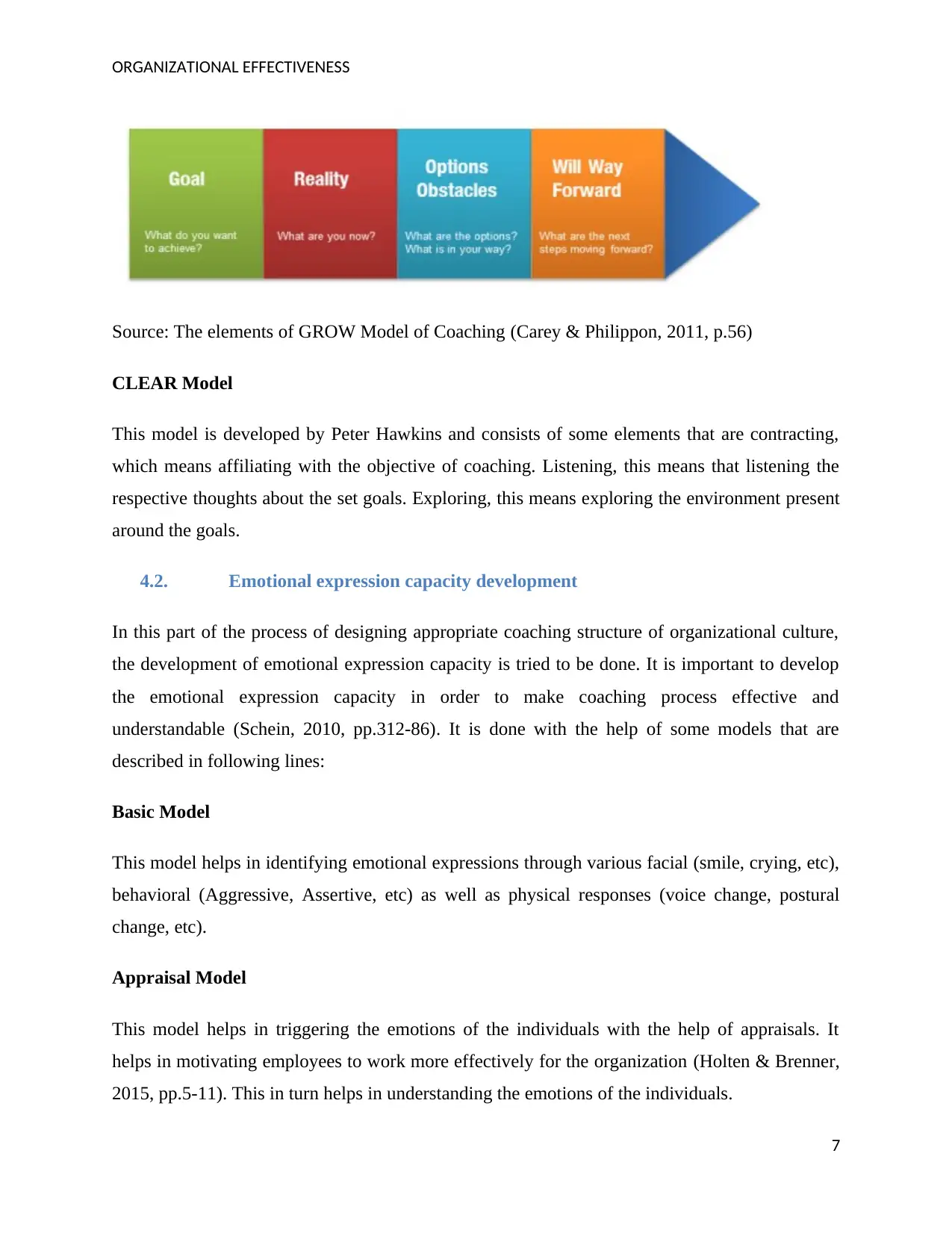
ORGANIZATIONAL EFFECTIVENESS
Source: The elements of GROW Model of Coaching (Carey & Philippon, 2011, p.56)
CLEAR Model
This model is developed by Peter Hawkins and consists of some elements that are contracting,
which means affiliating with the objective of coaching. Listening, this means that listening the
respective thoughts about the set goals. Exploring, this means exploring the environment present
around the goals.
4.2. Emotional expression capacity development
In this part of the process of designing appropriate coaching structure of organizational culture,
the development of emotional expression capacity is tried to be done. It is important to develop
the emotional expression capacity in order to make coaching process effective and
understandable (Schein, 2010, pp.312-86). It is done with the help of some models that are
described in following lines:
Basic Model
This model helps in identifying emotional expressions through various facial (smile, crying, etc),
behavioral (Aggressive, Assertive, etc) as well as physical responses (voice change, postural
change, etc).
Appraisal Model
This model helps in triggering the emotions of the individuals with the help of appraisals. It
helps in motivating employees to work more effectively for the organization (Holten & Brenner,
2015, pp.5-11). This in turn helps in understanding the emotions of the individuals.
7
Source: The elements of GROW Model of Coaching (Carey & Philippon, 2011, p.56)
CLEAR Model
This model is developed by Peter Hawkins and consists of some elements that are contracting,
which means affiliating with the objective of coaching. Listening, this means that listening the
respective thoughts about the set goals. Exploring, this means exploring the environment present
around the goals.
4.2. Emotional expression capacity development
In this part of the process of designing appropriate coaching structure of organizational culture,
the development of emotional expression capacity is tried to be done. It is important to develop
the emotional expression capacity in order to make coaching process effective and
understandable (Schein, 2010, pp.312-86). It is done with the help of some models that are
described in following lines:
Basic Model
This model helps in identifying emotional expressions through various facial (smile, crying, etc),
behavioral (Aggressive, Assertive, etc) as well as physical responses (voice change, postural
change, etc).
Appraisal Model
This model helps in triggering the emotions of the individuals with the help of appraisals. It
helps in motivating employees to work more effectively for the organization (Holten & Brenner,
2015, pp.5-11). This in turn helps in understanding the emotions of the individuals.
7
Paraphrase This Document
Need a fresh take? Get an instant paraphrase of this document with our AI Paraphraser
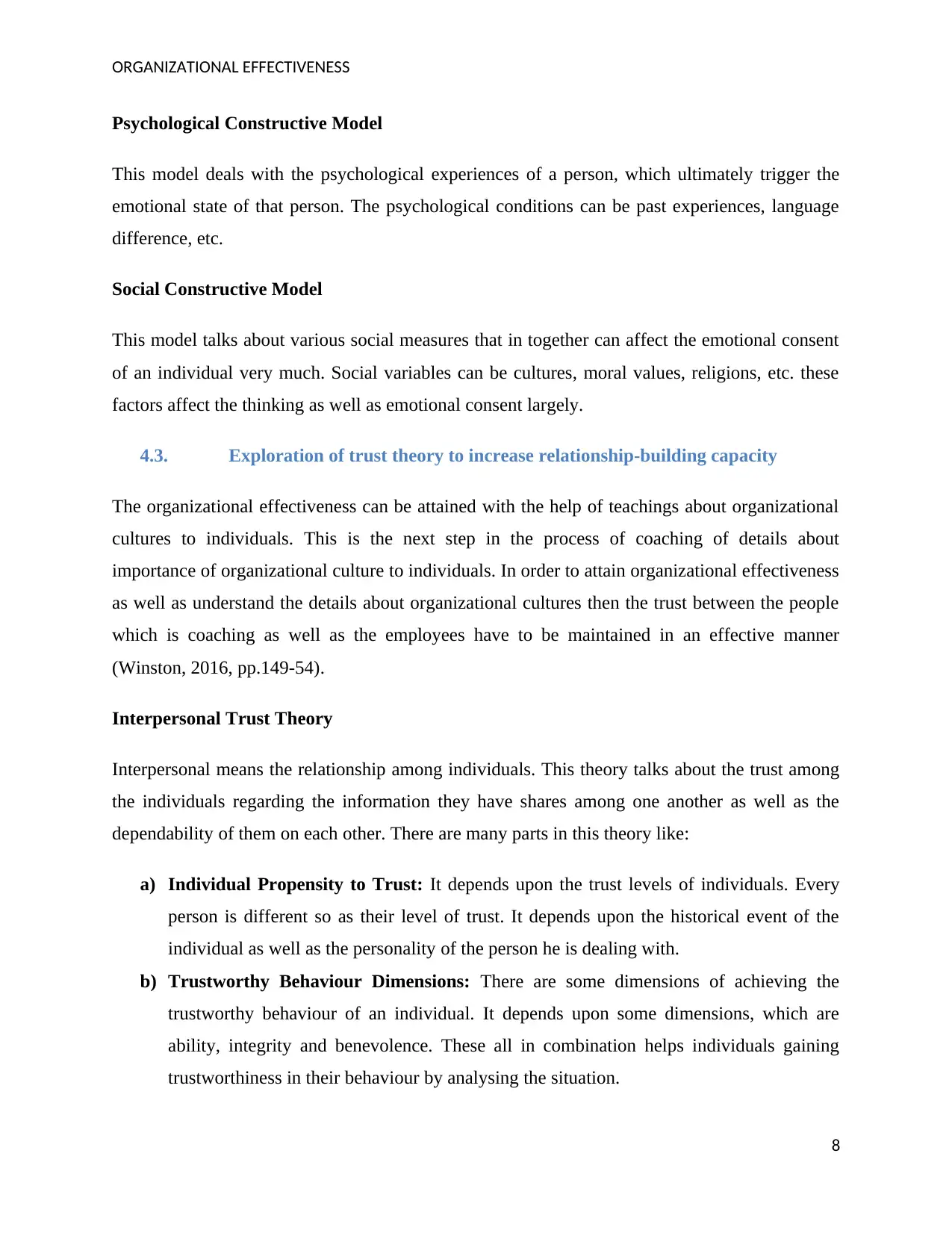
ORGANIZATIONAL EFFECTIVENESS
Psychological Constructive Model
This model deals with the psychological experiences of a person, which ultimately trigger the
emotional state of that person. The psychological conditions can be past experiences, language
difference, etc.
Social Constructive Model
This model talks about various social measures that in together can affect the emotional consent
of an individual very much. Social variables can be cultures, moral values, religions, etc. these
factors affect the thinking as well as emotional consent largely.
4.3. Exploration of trust theory to increase relationship-building capacity
The organizational effectiveness can be attained with the help of teachings about organizational
cultures to individuals. This is the next step in the process of coaching of details about
importance of organizational culture to individuals. In order to attain organizational effectiveness
as well as understand the details about organizational cultures then the trust between the people
which is coaching as well as the employees have to be maintained in an effective manner
(Winston, 2016, pp.149-54).
Interpersonal Trust Theory
Interpersonal means the relationship among individuals. This theory talks about the trust among
the individuals regarding the information they have shares among one another as well as the
dependability of them on each other. There are many parts in this theory like:
a) Individual Propensity to Trust: It depends upon the trust levels of individuals. Every
person is different so as their level of trust. It depends upon the historical event of the
individual as well as the personality of the person he is dealing with.
b) Trustworthy Behaviour Dimensions: There are some dimensions of achieving the
trustworthy behaviour of an individual. It depends upon some dimensions, which are
ability, integrity and benevolence. These all in combination helps individuals gaining
trustworthiness in their behaviour by analysing the situation.
8
Psychological Constructive Model
This model deals with the psychological experiences of a person, which ultimately trigger the
emotional state of that person. The psychological conditions can be past experiences, language
difference, etc.
Social Constructive Model
This model talks about various social measures that in together can affect the emotional consent
of an individual very much. Social variables can be cultures, moral values, religions, etc. these
factors affect the thinking as well as emotional consent largely.
4.3. Exploration of trust theory to increase relationship-building capacity
The organizational effectiveness can be attained with the help of teachings about organizational
cultures to individuals. This is the next step in the process of coaching of details about
importance of organizational culture to individuals. In order to attain organizational effectiveness
as well as understand the details about organizational cultures then the trust between the people
which is coaching as well as the employees have to be maintained in an effective manner
(Winston, 2016, pp.149-54).
Interpersonal Trust Theory
Interpersonal means the relationship among individuals. This theory talks about the trust among
the individuals regarding the information they have shares among one another as well as the
dependability of them on each other. There are many parts in this theory like:
a) Individual Propensity to Trust: It depends upon the trust levels of individuals. Every
person is different so as their level of trust. It depends upon the historical event of the
individual as well as the personality of the person he is dealing with.
b) Trustworthy Behaviour Dimensions: There are some dimensions of achieving the
trustworthy behaviour of an individual. It depends upon some dimensions, which are
ability, integrity and benevolence. These all in combination helps individuals gaining
trustworthiness in their behaviour by analysing the situation.
8
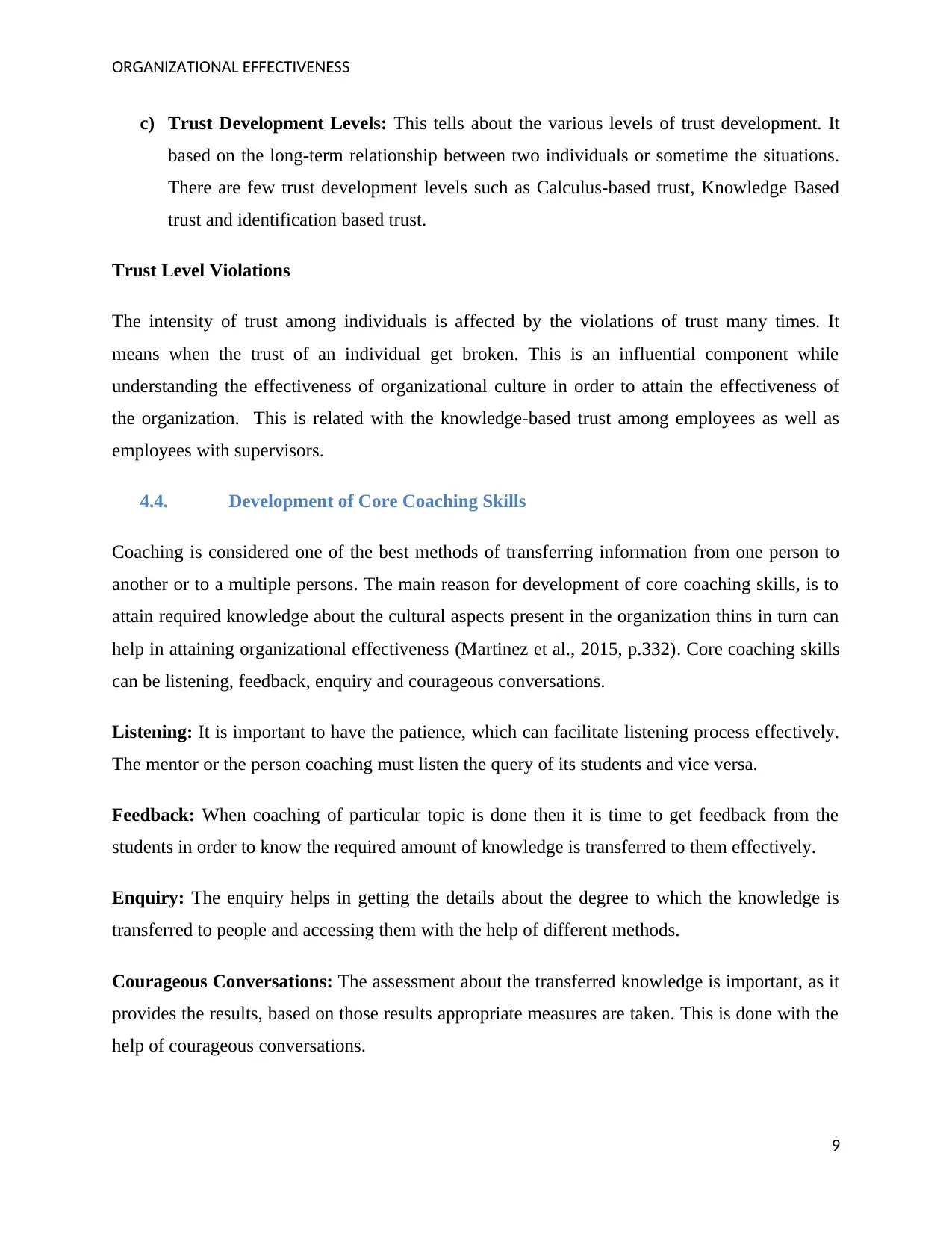
ORGANIZATIONAL EFFECTIVENESS
c) Trust Development Levels: This tells about the various levels of trust development. It
based on the long-term relationship between two individuals or sometime the situations.
There are few trust development levels such as Calculus-based trust, Knowledge Based
trust and identification based trust.
Trust Level Violations
The intensity of trust among individuals is affected by the violations of trust many times. It
means when the trust of an individual get broken. This is an influential component while
understanding the effectiveness of organizational culture in order to attain the effectiveness of
the organization. This is related with the knowledge-based trust among employees as well as
employees with supervisors.
4.4. Development of Core Coaching Skills
Coaching is considered one of the best methods of transferring information from one person to
another or to a multiple persons. The main reason for development of core coaching skills, is to
attain required knowledge about the cultural aspects present in the organization thins in turn can
help in attaining organizational effectiveness (Martinez et al., 2015, p.332). Core coaching skills
can be listening, feedback, enquiry and courageous conversations.
Listening: It is important to have the patience, which can facilitate listening process effectively.
The mentor or the person coaching must listen the query of its students and vice versa.
Feedback: When coaching of particular topic is done then it is time to get feedback from the
students in order to know the required amount of knowledge is transferred to them effectively.
Enquiry: The enquiry helps in getting the details about the degree to which the knowledge is
transferred to people and accessing them with the help of different methods.
Courageous Conversations: The assessment about the transferred knowledge is important, as it
provides the results, based on those results appropriate measures are taken. This is done with the
help of courageous conversations.
9
c) Trust Development Levels: This tells about the various levels of trust development. It
based on the long-term relationship between two individuals or sometime the situations.
There are few trust development levels such as Calculus-based trust, Knowledge Based
trust and identification based trust.
Trust Level Violations
The intensity of trust among individuals is affected by the violations of trust many times. It
means when the trust of an individual get broken. This is an influential component while
understanding the effectiveness of organizational culture in order to attain the effectiveness of
the organization. This is related with the knowledge-based trust among employees as well as
employees with supervisors.
4.4. Development of Core Coaching Skills
Coaching is considered one of the best methods of transferring information from one person to
another or to a multiple persons. The main reason for development of core coaching skills, is to
attain required knowledge about the cultural aspects present in the organization thins in turn can
help in attaining organizational effectiveness (Martinez et al., 2015, p.332). Core coaching skills
can be listening, feedback, enquiry and courageous conversations.
Listening: It is important to have the patience, which can facilitate listening process effectively.
The mentor or the person coaching must listen the query of its students and vice versa.
Feedback: When coaching of particular topic is done then it is time to get feedback from the
students in order to know the required amount of knowledge is transferred to them effectively.
Enquiry: The enquiry helps in getting the details about the degree to which the knowledge is
transferred to people and accessing them with the help of different methods.
Courageous Conversations: The assessment about the transferred knowledge is important, as it
provides the results, based on those results appropriate measures are taken. This is done with the
help of courageous conversations.
9
⊘ This is a preview!⊘
Do you want full access?
Subscribe today to unlock all pages.

Trusted by 1+ million students worldwide
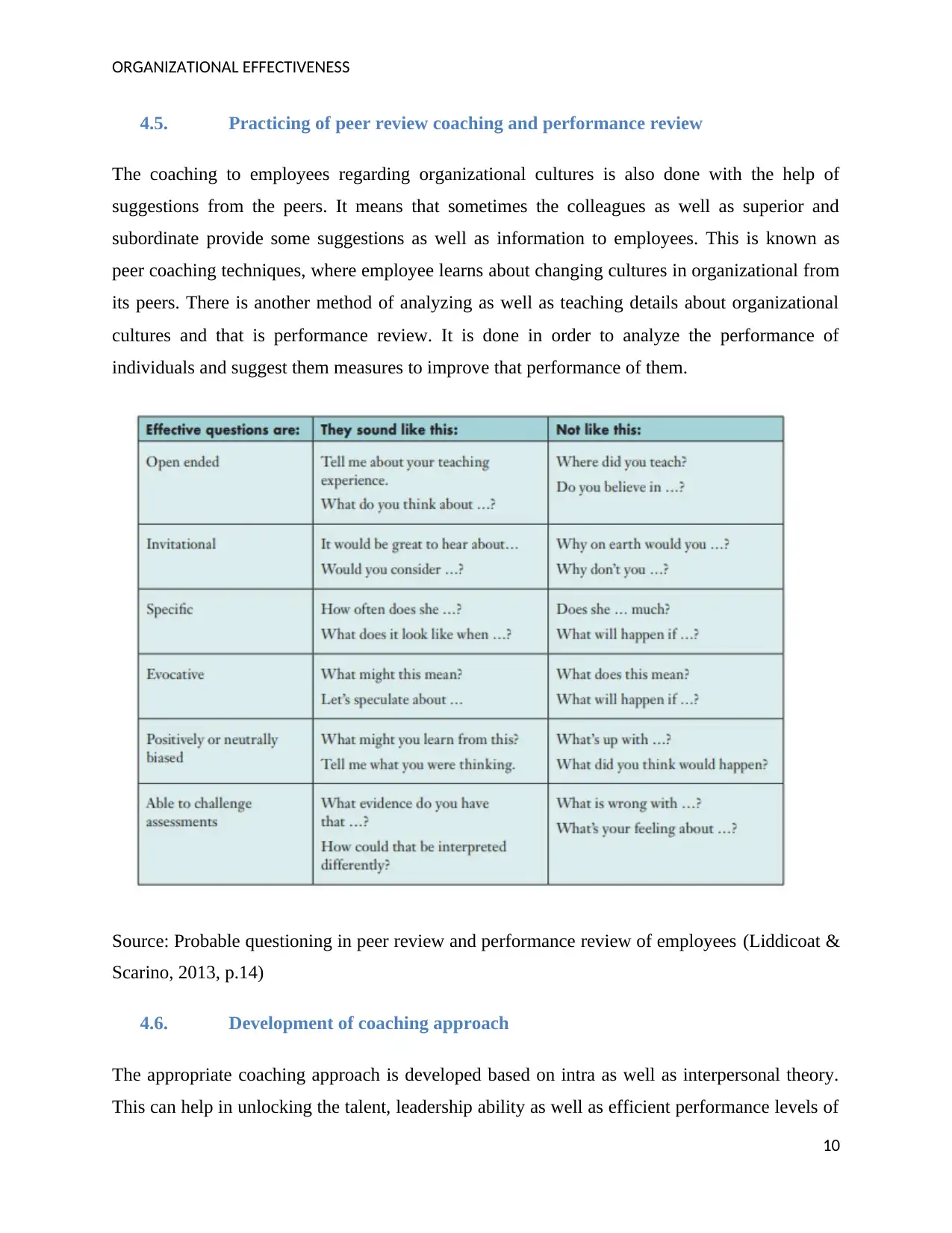
ORGANIZATIONAL EFFECTIVENESS
4.5. Practicing of peer review coaching and performance review
The coaching to employees regarding organizational cultures is also done with the help of
suggestions from the peers. It means that sometimes the colleagues as well as superior and
subordinate provide some suggestions as well as information to employees. This is known as
peer coaching techniques, where employee learns about changing cultures in organizational from
its peers. There is another method of analyzing as well as teaching details about organizational
cultures and that is performance review. It is done in order to analyze the performance of
individuals and suggest them measures to improve that performance of them.
Source: Probable questioning in peer review and performance review of employees (Liddicoat &
Scarino, 2013, p.14)
4.6. Development of coaching approach
The appropriate coaching approach is developed based on intra as well as interpersonal theory.
This can help in unlocking the talent, leadership ability as well as efficient performance levels of
10
4.5. Practicing of peer review coaching and performance review
The coaching to employees regarding organizational cultures is also done with the help of
suggestions from the peers. It means that sometimes the colleagues as well as superior and
subordinate provide some suggestions as well as information to employees. This is known as
peer coaching techniques, where employee learns about changing cultures in organizational from
its peers. There is another method of analyzing as well as teaching details about organizational
cultures and that is performance review. It is done in order to analyze the performance of
individuals and suggest them measures to improve that performance of them.
Source: Probable questioning in peer review and performance review of employees (Liddicoat &
Scarino, 2013, p.14)
4.6. Development of coaching approach
The appropriate coaching approach is developed based on intra as well as interpersonal theory.
This can help in unlocking the talent, leadership ability as well as efficient performance levels of
10
Paraphrase This Document
Need a fresh take? Get an instant paraphrase of this document with our AI Paraphraser
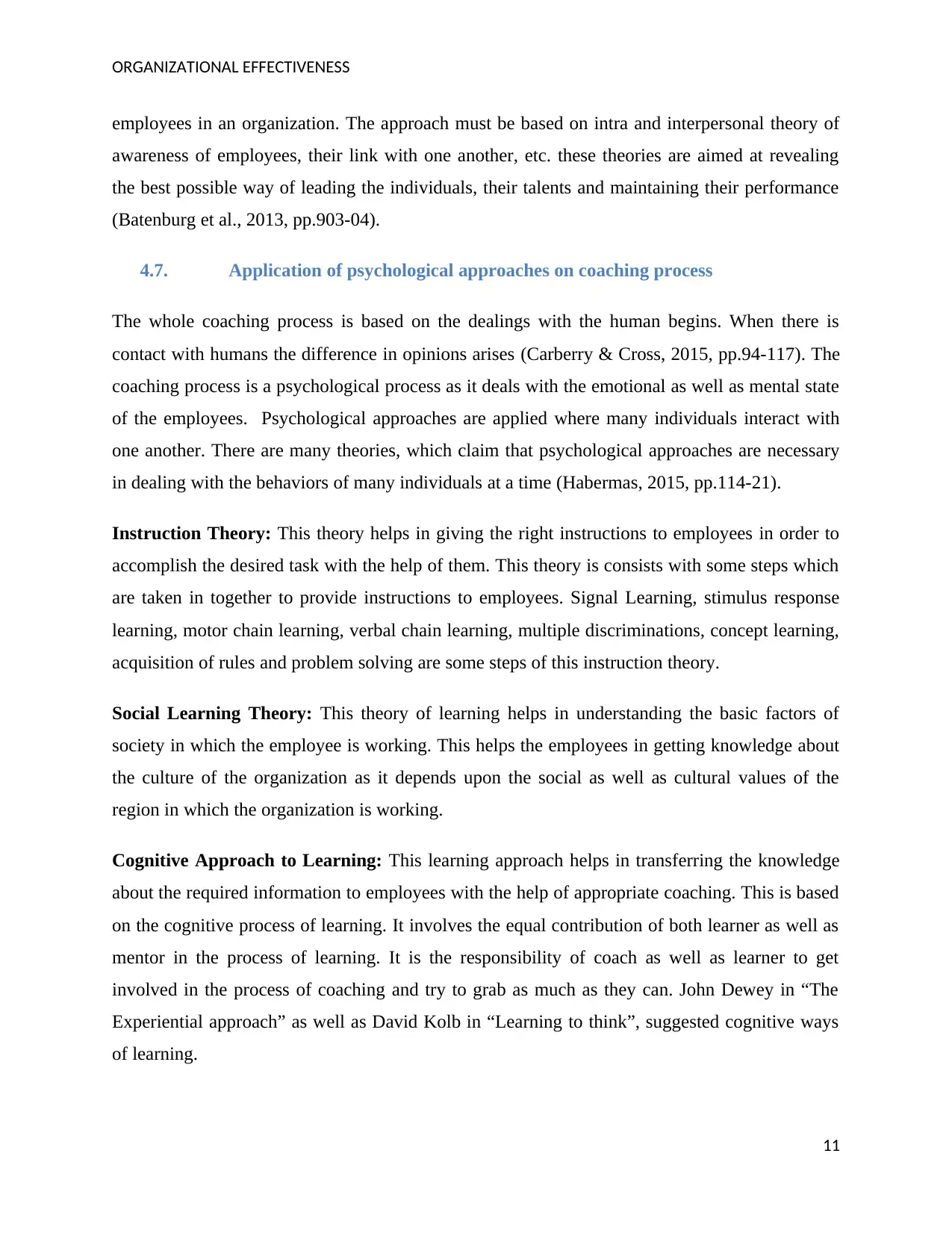
ORGANIZATIONAL EFFECTIVENESS
employees in an organization. The approach must be based on intra and interpersonal theory of
awareness of employees, their link with one another, etc. these theories are aimed at revealing
the best possible way of leading the individuals, their talents and maintaining their performance
(Batenburg et al., 2013, pp.903-04).
4.7. Application of psychological approaches on coaching process
The whole coaching process is based on the dealings with the human begins. When there is
contact with humans the difference in opinions arises (Carberry & Cross, 2015, pp.94-117). The
coaching process is a psychological process as it deals with the emotional as well as mental state
of the employees. Psychological approaches are applied where many individuals interact with
one another. There are many theories, which claim that psychological approaches are necessary
in dealing with the behaviors of many individuals at a time (Habermas, 2015, pp.114-21).
Instruction Theory: This theory helps in giving the right instructions to employees in order to
accomplish the desired task with the help of them. This theory is consists with some steps which
are taken in together to provide instructions to employees. Signal Learning, stimulus response
learning, motor chain learning, verbal chain learning, multiple discriminations, concept learning,
acquisition of rules and problem solving are some steps of this instruction theory.
Social Learning Theory: This theory of learning helps in understanding the basic factors of
society in which the employee is working. This helps the employees in getting knowledge about
the culture of the organization as it depends upon the social as well as cultural values of the
region in which the organization is working.
Cognitive Approach to Learning: This learning approach helps in transferring the knowledge
about the required information to employees with the help of appropriate coaching. This is based
on the cognitive process of learning. It involves the equal contribution of both learner as well as
mentor in the process of learning. It is the responsibility of coach as well as learner to get
involved in the process of coaching and try to grab as much as they can. John Dewey in “The
Experiential approach” as well as David Kolb in “Learning to think”, suggested cognitive ways
of learning.
11
employees in an organization. The approach must be based on intra and interpersonal theory of
awareness of employees, their link with one another, etc. these theories are aimed at revealing
the best possible way of leading the individuals, their talents and maintaining their performance
(Batenburg et al., 2013, pp.903-04).
4.7. Application of psychological approaches on coaching process
The whole coaching process is based on the dealings with the human begins. When there is
contact with humans the difference in opinions arises (Carberry & Cross, 2015, pp.94-117). The
coaching process is a psychological process as it deals with the emotional as well as mental state
of the employees. Psychological approaches are applied where many individuals interact with
one another. There are many theories, which claim that psychological approaches are necessary
in dealing with the behaviors of many individuals at a time (Habermas, 2015, pp.114-21).
Instruction Theory: This theory helps in giving the right instructions to employees in order to
accomplish the desired task with the help of them. This theory is consists with some steps which
are taken in together to provide instructions to employees. Signal Learning, stimulus response
learning, motor chain learning, verbal chain learning, multiple discriminations, concept learning,
acquisition of rules and problem solving are some steps of this instruction theory.
Social Learning Theory: This theory of learning helps in understanding the basic factors of
society in which the employee is working. This helps the employees in getting knowledge about
the culture of the organization as it depends upon the social as well as cultural values of the
region in which the organization is working.
Cognitive Approach to Learning: This learning approach helps in transferring the knowledge
about the required information to employees with the help of appropriate coaching. This is based
on the cognitive process of learning. It involves the equal contribution of both learner as well as
mentor in the process of learning. It is the responsibility of coach as well as learner to get
involved in the process of coaching and try to grab as much as they can. John Dewey in “The
Experiential approach” as well as David Kolb in “Learning to think”, suggested cognitive ways
of learning.
11
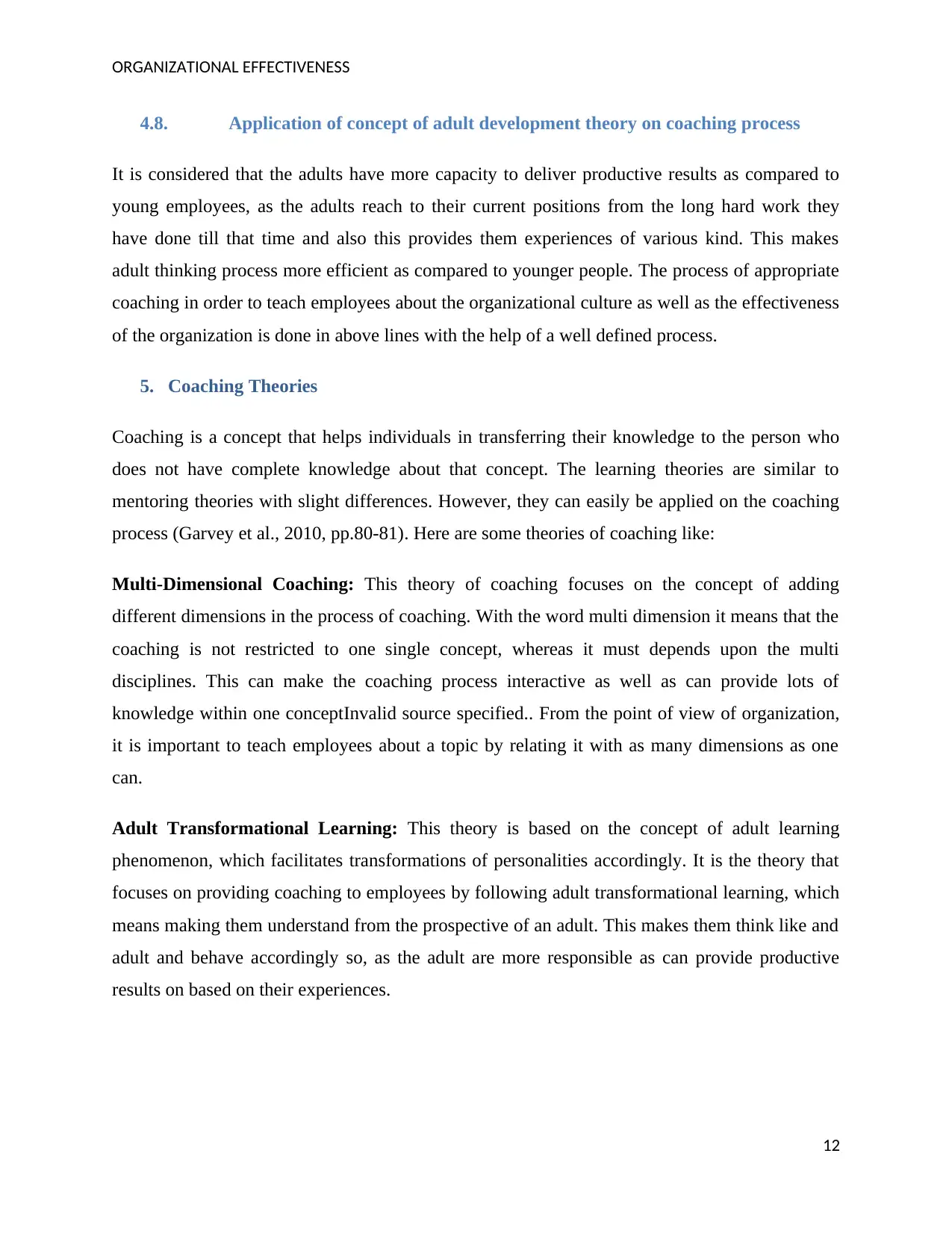
ORGANIZATIONAL EFFECTIVENESS
4.8. Application of concept of adult development theory on coaching process
It is considered that the adults have more capacity to deliver productive results as compared to
young employees, as the adults reach to their current positions from the long hard work they
have done till that time and also this provides them experiences of various kind. This makes
adult thinking process more efficient as compared to younger people. The process of appropriate
coaching in order to teach employees about the organizational culture as well as the effectiveness
of the organization is done in above lines with the help of a well defined process.
5. Coaching Theories
Coaching is a concept that helps individuals in transferring their knowledge to the person who
does not have complete knowledge about that concept. The learning theories are similar to
mentoring theories with slight differences. However, they can easily be applied on the coaching
process (Garvey et al., 2010, pp.80-81). Here are some theories of coaching like:
Multi-Dimensional Coaching: This theory of coaching focuses on the concept of adding
different dimensions in the process of coaching. With the word multi dimension it means that the
coaching is not restricted to one single concept, whereas it must depends upon the multi
disciplines. This can make the coaching process interactive as well as can provide lots of
knowledge within one conceptInvalid source specified.. From the point of view of organization,
it is important to teach employees about a topic by relating it with as many dimensions as one
can.
Adult Transformational Learning: This theory is based on the concept of adult learning
phenomenon, which facilitates transformations of personalities accordingly. It is the theory that
focuses on providing coaching to employees by following adult transformational learning, which
means making them understand from the prospective of an adult. This makes them think like and
adult and behave accordingly so, as the adult are more responsible as can provide productive
results on based on their experiences.
12
4.8. Application of concept of adult development theory on coaching process
It is considered that the adults have more capacity to deliver productive results as compared to
young employees, as the adults reach to their current positions from the long hard work they
have done till that time and also this provides them experiences of various kind. This makes
adult thinking process more efficient as compared to younger people. The process of appropriate
coaching in order to teach employees about the organizational culture as well as the effectiveness
of the organization is done in above lines with the help of a well defined process.
5. Coaching Theories
Coaching is a concept that helps individuals in transferring their knowledge to the person who
does not have complete knowledge about that concept. The learning theories are similar to
mentoring theories with slight differences. However, they can easily be applied on the coaching
process (Garvey et al., 2010, pp.80-81). Here are some theories of coaching like:
Multi-Dimensional Coaching: This theory of coaching focuses on the concept of adding
different dimensions in the process of coaching. With the word multi dimension it means that the
coaching is not restricted to one single concept, whereas it must depends upon the multi
disciplines. This can make the coaching process interactive as well as can provide lots of
knowledge within one conceptInvalid source specified.. From the point of view of organization,
it is important to teach employees about a topic by relating it with as many dimensions as one
can.
Adult Transformational Learning: This theory is based on the concept of adult learning
phenomenon, which facilitates transformations of personalities accordingly. It is the theory that
focuses on providing coaching to employees by following adult transformational learning, which
means making them understand from the prospective of an adult. This makes them think like and
adult and behave accordingly so, as the adult are more responsible as can provide productive
results on based on their experiences.
12
⊘ This is a preview!⊘
Do you want full access?
Subscribe today to unlock all pages.

Trusted by 1+ million students worldwide
1 out of 19
Related Documents
Your All-in-One AI-Powered Toolkit for Academic Success.
+13062052269
info@desklib.com
Available 24*7 on WhatsApp / Email
![[object Object]](/_next/static/media/star-bottom.7253800d.svg)
Unlock your academic potential
Copyright © 2020–2026 A2Z Services. All Rights Reserved. Developed and managed by ZUCOL.





